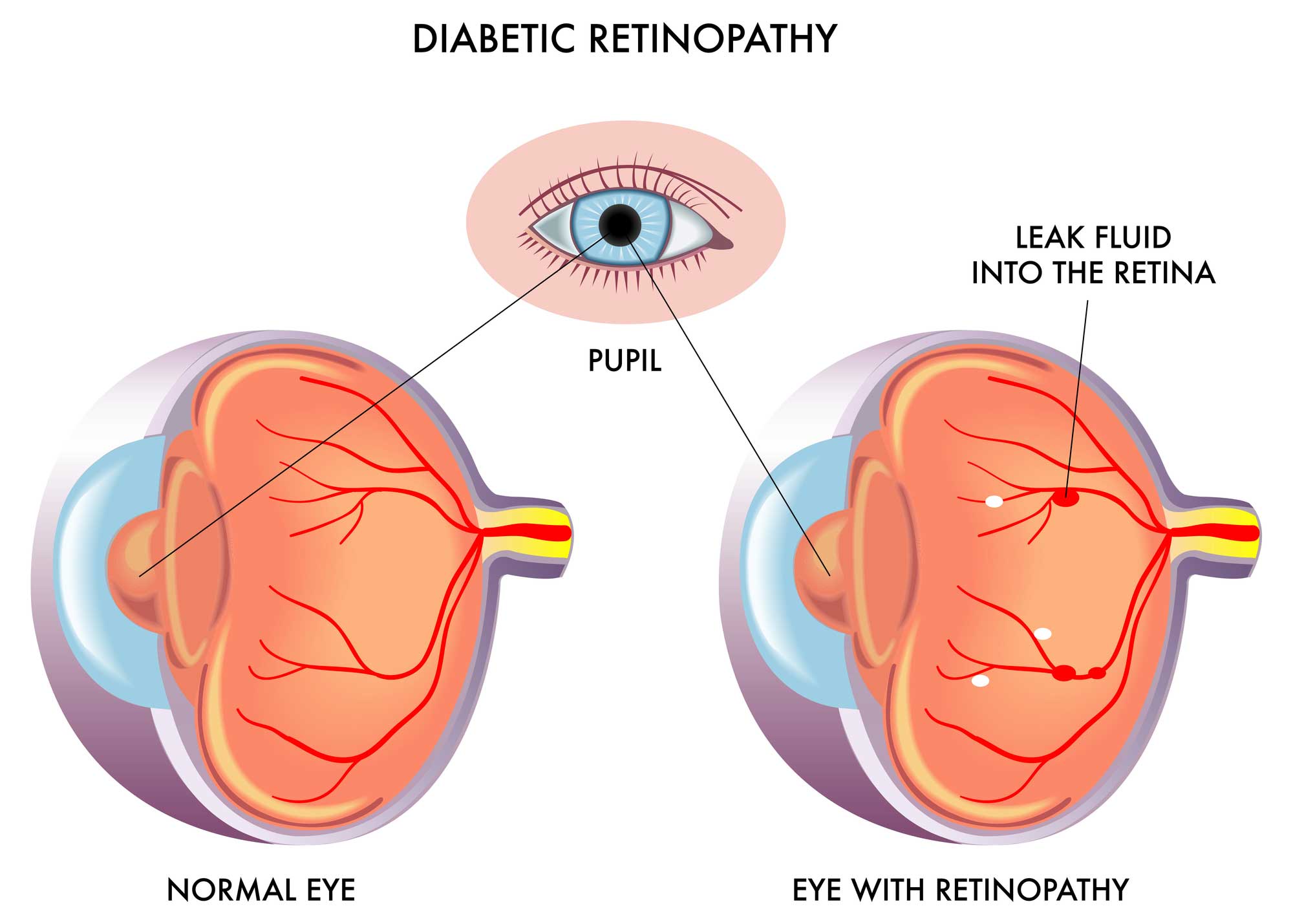Diabetes affects more than just your blood sugar levels; unfortunately, it can also damage your eyes. There are several different types of eye complications from diabetes. So if you are diabetic, protect the health of your eyes by keeping your insulin levels in check and consulting your doctor if you notice any changes to your vision or eye health. Scroll down to learn how diabetes affects your eyes and how to spot signs of these complications before your vision is permanently affected.
Eye Complications from Diabetes
Diabetic Retinopathy
Diabetic retinopathy is a retina disorder caused by diabetes, and it is a leading cause of blindness in American adults (source). The two main types of retinopathy are nonproliferative and proliferative.
In nonproliferative retinopathy, capillaries in the back of your eye balloon and form pouches. As this disease progresses, more and more blood vessels become blocked.
Nonproliferative retinopathy can progress into proliferative retinopathy. In this form, blood vessels can close off completely due to significant damage. In order to fight the problem, new blood vessels start growing in your retina. Unfortunately, these new vessels are not as strong, and they can leak blood that blocks your vision. This can even cause retinal detachment, which is why you should see an eye doctor immediately if you think you are developing retinopathy.
Glaucoma
Having diabetes puts you at a much higher risk for developing glaucoma. Glaucoma is a disease that damages your eye’s optic nerve and is caused by pressure build up in the eye. This disease usually shows no symptoms in its early stages, but the first sign of glaucoma is often noticeable vision loss.
There are two main types of glaucoma: primary open-angle glaucoma and angle-closure glaucoma. Primary open-angle glaucoma happens gradually, where the eye does not drain fluid as well as it should, similar to a clogged drain. Angle-closure glaucoma occurs when eye pressure causes an iris to move close to the drainage angle in the eye. The iris can end up blocking the drainage angle, which causes sudden blurred vision and severe eye pain.
See a doctor immediately if you notice symptoms of glaucoma because it is an eye emergency that can lead to blindness.
Cataracts
Cataracts affect those with diabetes and those without diabetes alike. However, having diabetes puts you at a higher risk of developing cataracts, especially at a younger age. In eyes with cataracts, the clear lens begins to cloud, which blocks light from entering. If you have cataracts, you’ll need to wear sunglasses more often. Once your cataracts reach a certain stage, your doctor might recommend a lens transplant. In patients with diabetes, glaucoma can develop after this procedure.
Blurry Vision
If your vision is slightly blurry, it could be a sign that your blood sugar is high. If this is the case, you’ll need to get your blood sugar back into the healthy target range, but this won’t be a quick fix. It can take up to three months for your vision to get back to normal. Make sure to tell your optometrist if you are experiencing blurred vision.
Prevent Eye Complications from Diabetes
If you have diabetes, take the following steps to maintain healthy eyesight:
- Control your blood sugar.
- Receive regular checkups from an optometrist.
- Visit your doctor regularly.
- Maintain healthy cholesterol levels and blood pressure.
- Exercise at least three times a week.
Are you looking for an eye professional in southwest Missouri? Contact Heffington’s. Since 1975, the Heffington family has been assisting the Springfield community with top-quality eye care and affordable eyeglasses and contacts. One of the unique features of our family-owned business is that we manufacture lenses at our own laboratory, giving us total control over the service and pricing, and we’re happy to pass our savings on to you. To learn more about our products and services, please get in touch with us online, send an email to asktheexperts@heffingtons.com, or give us a call at 417-869-3937 (Optiland location) or 417-882-3937 (House of Vision location). We look forward to hearing from you!

